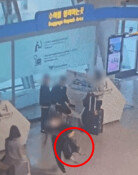Middle Easts misery and South Korea-Japan peace
Middle Easts misery and South Korea-Japan peace
Posted February. 12, 2015 08:14,
Despite many people`s desperate wish, a miserable end was waiting. I am talking about the two Japanese hostages held by the Islamic State (IS). Kenji Goto, the second victim, was a journalist who reported on poor people and children suffering from the war. The "I am Kenji" movement spread around the world just to save at least him.
The surfacing of the incident reminded me of what happened 11 years ago. In April 2004, three Japanese people were captured by a jihadist group in Iraq. The group released a video showing a man wearing a mask pointing a gun at them. He demanded that Japan withdraw its Self-Defense Forces troops from Iraq. The three hostages were Self-Defense Forces troops sent to Samawah to support Iraq`s restoration.
Although Tokyo did not accept the demand, the question of what the Asahi Shimbun would argue on the issue was a difficult question to me as the editor-in-chief of the daily newspaper, which strongly criticized the Iraq War for having no justifiable cause and opposed Japan`s troop deployment because of danger. After heated in-house debates, however, the paper concluded that Japan "cannot bow to the threats and pull out its troops."
We received plenty of criticisms from readers for "betraying" them. However, complying with such cowardly means would make the terrorists` wish come true.
I do not think that we made a wrong decision, but I am sure that I would have felt bitter if the hostages had been killed. After I had about seven sleepless nights, the hostages were finally released. I can never forget the sense of relief that was beyond description.
This time, however, the terrorists were of the worst kind. Even Palestine and other Islamic countries treat them as gangsters. Dialogue with them is impossible because they deny the Christianity and negate the borders that the West drew in the Middle East in the past. The chaos and hopeless life in the Islamic society in addition to religious and ethnic confrontations drove them into combats. The history of hatred dates back to the Medieval Age, as they call the coalition troops "Crusaders" and target even Japan, arguing that Tokyo had participated in the Crusade.
Now, East Asia is peaceful, compared with the Middle East. Some might argue that it is not because of North Korea`s nuclear and missile threats and its unresolved abduction of Japanese citizens. Japan and China have diplomatic rows, and so do South Korea and Japan. However, it is a fact that there has been no war in the region for six decades since the armistice of the 1950-1953 Korean War. Japan has not started a war for 70 years since the end of World War II.
Europe had the Kosovo War. Considering that there are conflicts between Ukraine and Russia as well as in the Middle East, East Asia`s maintaining of peace is meaningful. There may be various factors, but I think that the absence of acute religious confrontation played an important role.
As if to symbolize such peace, 1,400 tourists from across Japan will visit South Korea for three days from Thursday (February 12) under the "South Korea-Japan friendship and exchange tour" program designed by local travel agencies to mark the 50th anniversary of the normalization of the bilateral ties. The three-day tour program offers various events. Leading the program is Toshihiro Nikai, chairman of the General Council of Japan`s ruling Liberal Democratic Party and head of head of the All Nippon Travel Agents Association.
Known as a pro-China politician, Nikai also has deep bonds with Korea. When Toyotomi Hideyoshi invaded Joseon about 500 years ago, one of his generals commanding an elite musketeer unit revolted, saying the war had no just cause and later defecting to Joseon to become a general named Kim Chung-seon. While much about him remains in mystery, the theory that he came from Wakayama is widely accepted. Wakayama is Nikai`s electoral district. A monument dedicated to General Kim Chung-seon is erected in Wakayama.
When I met Nikai, he said with a smile that the number of tourists joining the program swelled as I appealed to them about the importance of exchanges between people of the two neighbors. He also visits Seoul in a silent protest against the governments in Seoul and Tokyo for the uncertainties over a summit.
Isn`t such a thing unimaginable in the Middle East? South Korea and Japan must take such peace preciously and take leading roles for peace in East Asia. The leaders of the two countries should show their views of history and broad-mindedness to the world rather than continuing their childish fight.
(Written by Yoshibumi Wakamiya, senior fellow of Japan Center for International Exchange and former chief editor of the Asahi Shimbun)







